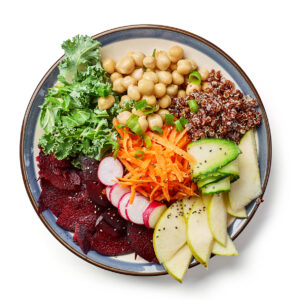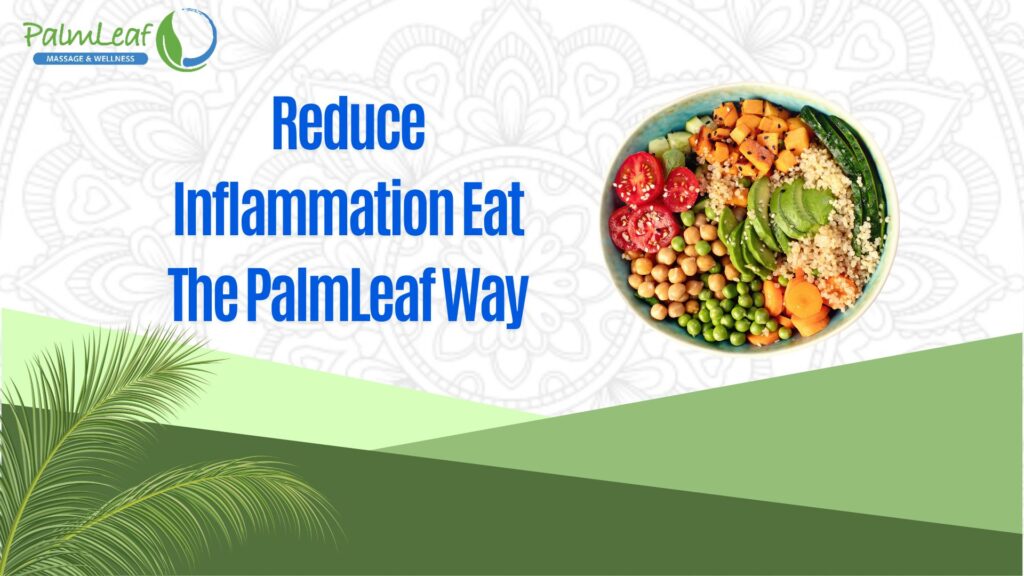
My wife, Jeanette “Jen” Mascarenas, is vegan and very knowledgeable about food’s nutritional values. Many of my clients have inflammatory issues that cause aches and pains, so I requested my wife write an article to help people eat to reduce inflammation.
Enjoy!
Ramon & Jen 🙂
Plant foods reduce inflammation, fight pain and prevent or improve an astounding number of diseases including heart disease, diabetes, many cancers and many autoimmune diseases. Animal foods do the opposite. Take a vitamin B-12 supplement. B-12 is the only nutrient you cannot get from plants.
- Beans, lentils and peas provide fiber plus protein for growth and wound healing
- Whole grains provide fiber plus carbohydrates (starches) for clean-burning energy
- Fruits and vegetables provide fiber plus phytonutrients that fight inflammation, pain and disease
Sugar increases inflammation, pain and wrinkles.
Refined sugars like white sugar, brown sugar and high-fructose corn syrup don’t provide vitamins and minerals, they take nutrients out of your body.
Here are some healthier ways to satisfy your sweet tooth. Just don’t go crazy; they still raise your blood sugar.
- Fresh or dried fruit
- Evaporated cane juice still contains some of the sugar cane’s nutrients (brand names are Rapidura and Sucanat)
- Molasses is high in iron and other minerals
- Honey
- Brown rice syrup
- Maple syrup
- Sweet potatoes and yams
The more variety of foods you eat, the more likely it is that you are getting all the nutrients you need. Colors represent nutrients. Eat as many different colors each day as you can.
Traditional food processing increases nutrient content and/or makes nutrients easier to absorb. Modern food processing removes nutrients to extend shelf life. Examples of traditional processing include, fermented foods like yogurt, sauerkraut and soy sauce, wheat made into yeast bread, boiled potatoes and stir-fried vegetables.
I’m not saying never eat fat, just cut way down. Too much fat puts a heavy toll on your system. (Note: If you experience pain/diarrhea after eating a high-fat meal, you may have a dysfunctional gallbladder. Try cutting way down on fat and when eating a higher fat food combine it with a high fiber food.)
Foods high in fat include:
- Animal foods, including things labeled “low-fat”
- Restaurant foods and fast food
- Fried foods, including stir-fried foods
- Olives, olive oil
- Margarine, shortening and all oils
- Mayo, salad dressings
- Coconut, coconut oil, coconut milk, inc. light
- Cheese, including non-dairy varieties
- Avocado and guacamole
- Chocolate, cocoa
- Coffee with creamer
- Ice cream, including non-dairy varieties
- Donuts, pastries and most desserts
- Peanuts, peanut butter
- Nuts, nut butters and seeds
Resources: Forks Over Knives, available on Netflix; The China Study, by T. Colin Campbell, PhD.; Dr. McDougall’s Digestive Tune-up, by Dr. John McDougall; Dr. Dean Ornish’s Program for Reversing Heart Disease, by Dr. Dean Ornish; Dr. Neal Barnard’s Program for Reversing Diabetes, by Dr. Neal Barnard; PCRM.org (Physician’s Committee for Responsible Medicine), founded by Dr. Neal Barnard; HappyCow.net, veg‑friendly restaurant finder. Just Google “vegan recipes” or “vegan” plus whatever you like to eat.
Related Link: Magnesium: essential anti-inflammatory nutrient
 Ramon Mascarenas is the owner of PalmLeaf Massage & Wellness. Jen Mascarenas is his wife and a vegan who believes in a whole-food, plant-based diet to promote vitality. She shares vegan recipes and writes abstract research articles for PalmLeaf Massage & Wellness. Ramon Mascarenas and his associates have licensed massage therapists who practice Myofascial Trigger Point Therapy and other medical massage modalities. Their services expanded along with Acupuncture, Chiropractic care and Cryo Body Sculpting to promote wellness and help clients with pain management through self-care exercises.
Ramon Mascarenas is the owner of PalmLeaf Massage & Wellness. Jen Mascarenas is his wife and a vegan who believes in a whole-food, plant-based diet to promote vitality. She shares vegan recipes and writes abstract research articles for PalmLeaf Massage & Wellness. Ramon Mascarenas and his associates have licensed massage therapists who practice Myofascial Trigger Point Therapy and other medical massage modalities. Their services expanded along with Acupuncture, Chiropractic care and Cryo Body Sculpting to promote wellness and help clients with pain management through self-care exercises.
Book now at https://palmleafmassage.com. If you have any questions, please call us at 847.961.4800





